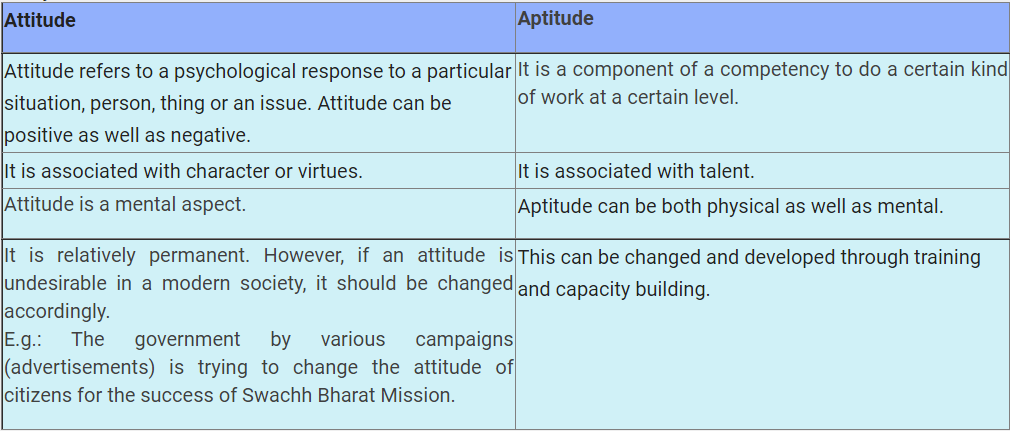-
02 Aug 2022
GS Paper 4
Theoretical Questions
Day 23: How do aptitude and attitude differ from one another? Describe the importance of both in the life of civil servants. (150 words)
- Start your answer by giving a brief over Attitude and Aptitude
- Mention the differences between Attitude and Aptitude
- Discuss the significance of a right Aptitude and Attitude in the life of a civil servant
- Conclude by giving equal importance to both Attitude and Aptitude
Answer
Aptitude is a component of a competency to do a certain kind of work at a certain level while attitude refers to a psychological response to a particular situation, person, thing or an issue.
Aptitude relates with talent and competency of a person whereas attitude is associated with character or virtue.
Both attitude and aptitude are essential traits to succeed in any walk of life. However, they become more important in civil services for its impact on society.
Importance of Aptitude in the life of a Civil Servant
- The civil services form the permanent structure and backbone of the administration. A qualitative, professional, skilled and committed workforce is, hence imperative to maintain the high standards of public administration.
- In Indian public administration, the civil servants are entrusted with a diverse set of responsibilities such as from simple administrative and clerical tasks to complex decision making, policy implementation and serving as a link between government and citizens. Hence, it is vital for civil servants to possess diverse skills such as grasping capabilities, good analytical skills, and ability to establish collaborative networks and successful teamwork.
- Laws and administrative rules cannot explain everything, and leaders cannot always mimic previous successes because the elements affecting each challenge change day to day. In such cases a civil servant needs an abundance of impromptu decision-making skills and critical thinking ability to exercise discretion with conviction.
- The emerging concept of e-governance and motto of ‘Less Government More Governance’, demand transformational changes in the machinery of government as well as in the work style and orientation of government officials. With the role and functions of Aptitude & Foundational Values for Civil Services 3 administrators having become swiftly changing and increasingly challenging, civil servants must be equipped with the necessary skills and capabilities to meet these new challenges. They must have the aptitude to master new technologies and new styles of functioning. They should serve as the ‘Agents of Change’ to catalyse reform initiatives.
Role and Importance of Positive Attitude in the life of a Civil Servant
A positive attitude is considered to be an essential characteristic of a civil servant who is often required to function under extreme stress. Having a positive attitude helps a civil servant in:
- Improving his/her problem-solving abilities: A civil servant with a positive mind-set has more capacity to consume new information. This, in turn, improves perspective and an ability to ‘connect the dots’ while dealing with matters of public interest.
- Enhancement of resilience: Positive thinking and attitude can help a civil servant to build greater resilience. This is because positive emotions help a person to quickly recover from negative emotions that he/she develops due to failures or mistakes in decision making and subsequent actions/consequences.
- Improving his/her Decision-Making Skills: Maintaining a positive mindset and attitude during adverse circumstances results in better decision making.
Thus, both attitude and aptitude hold immense potential in the life of a civil servant.





